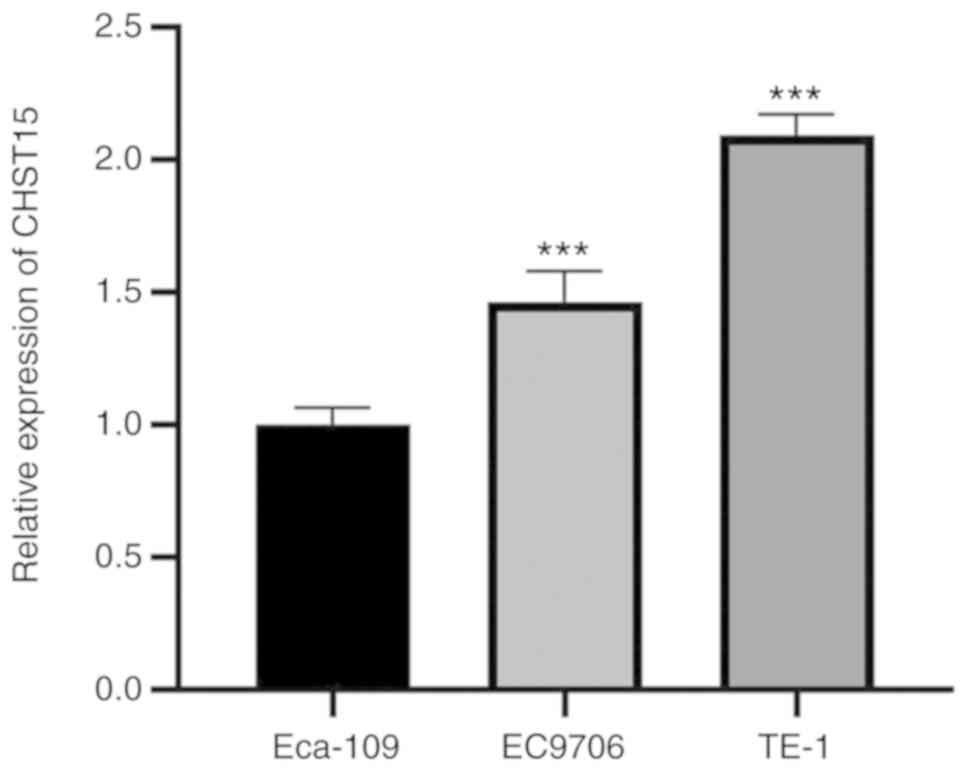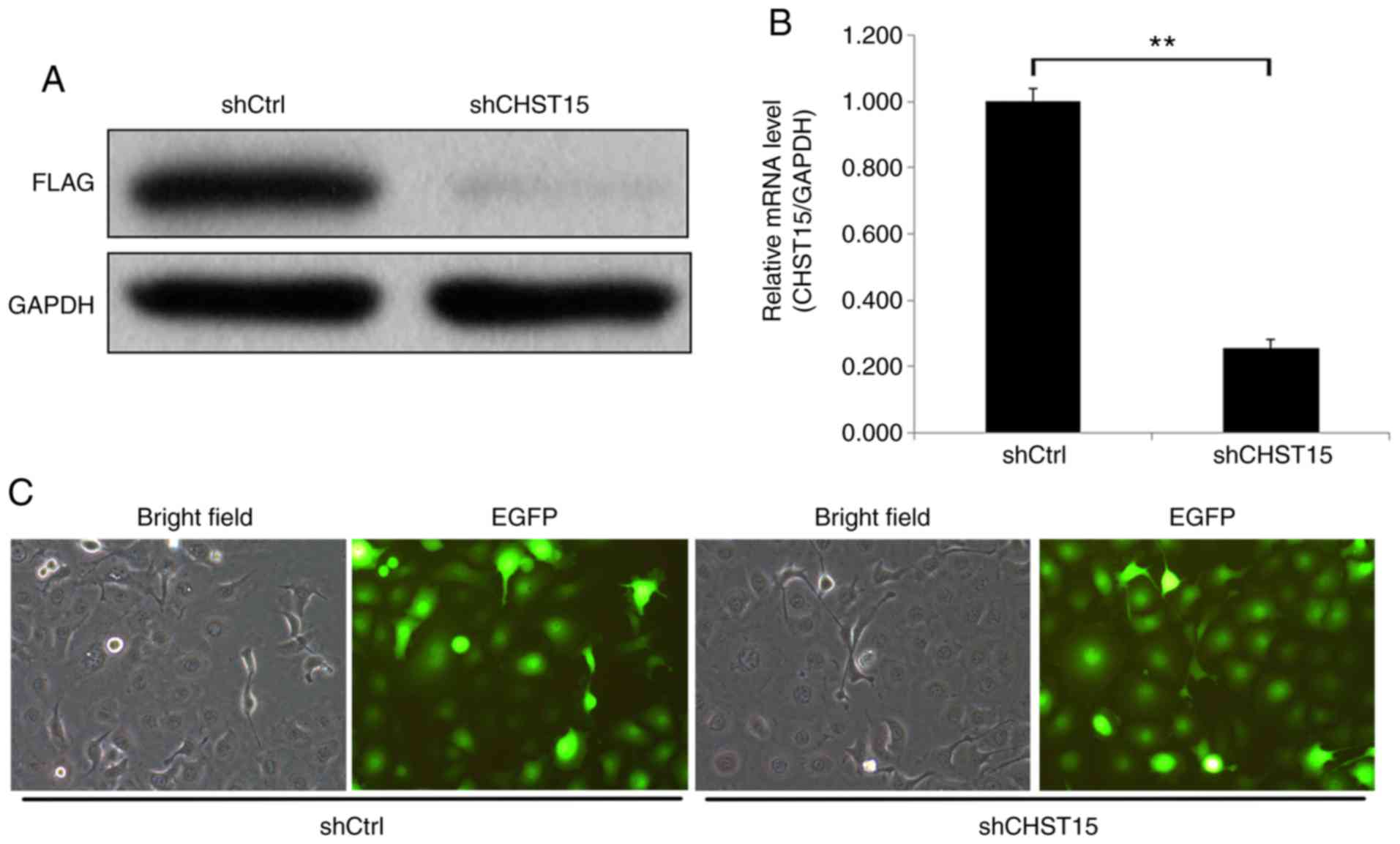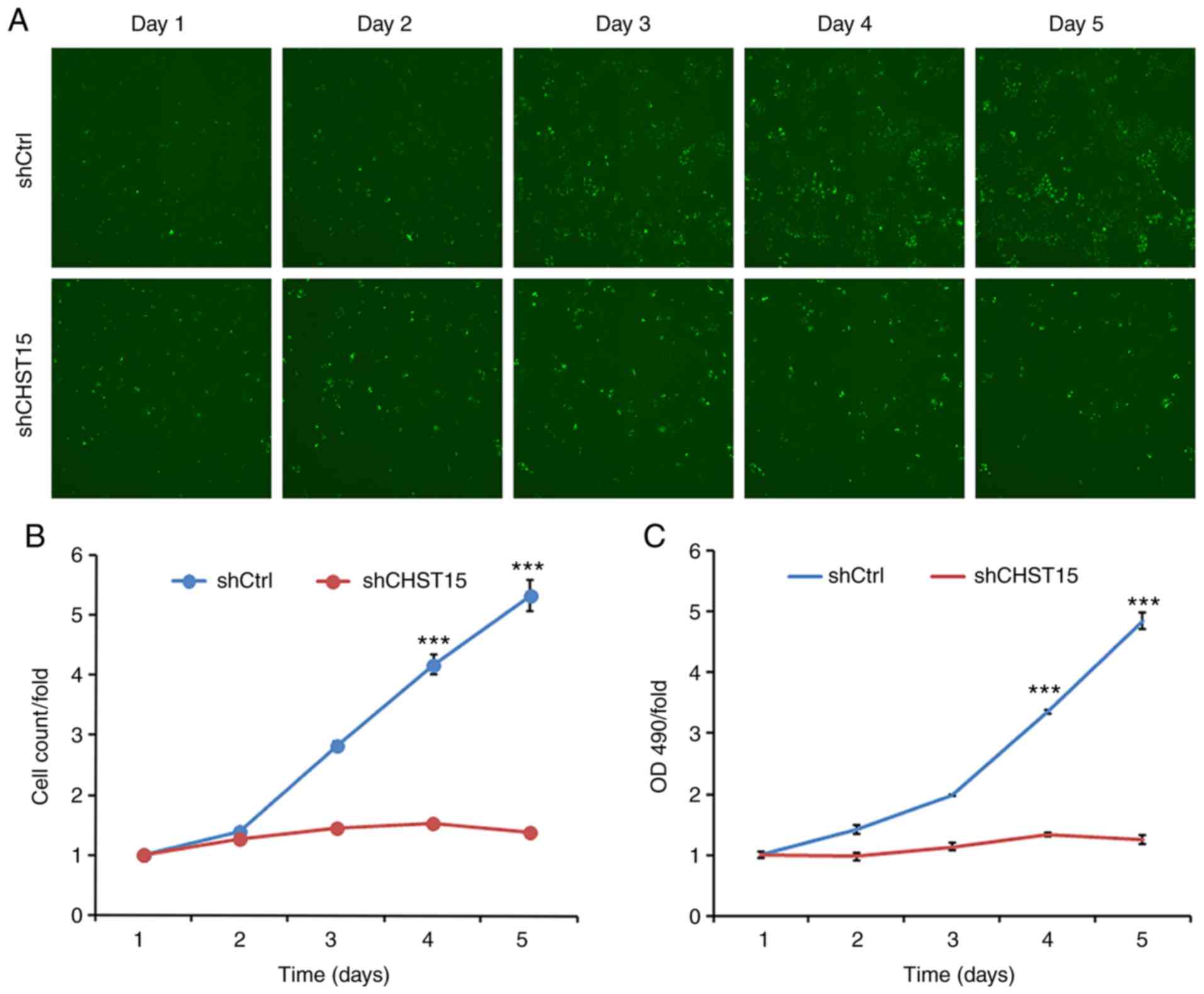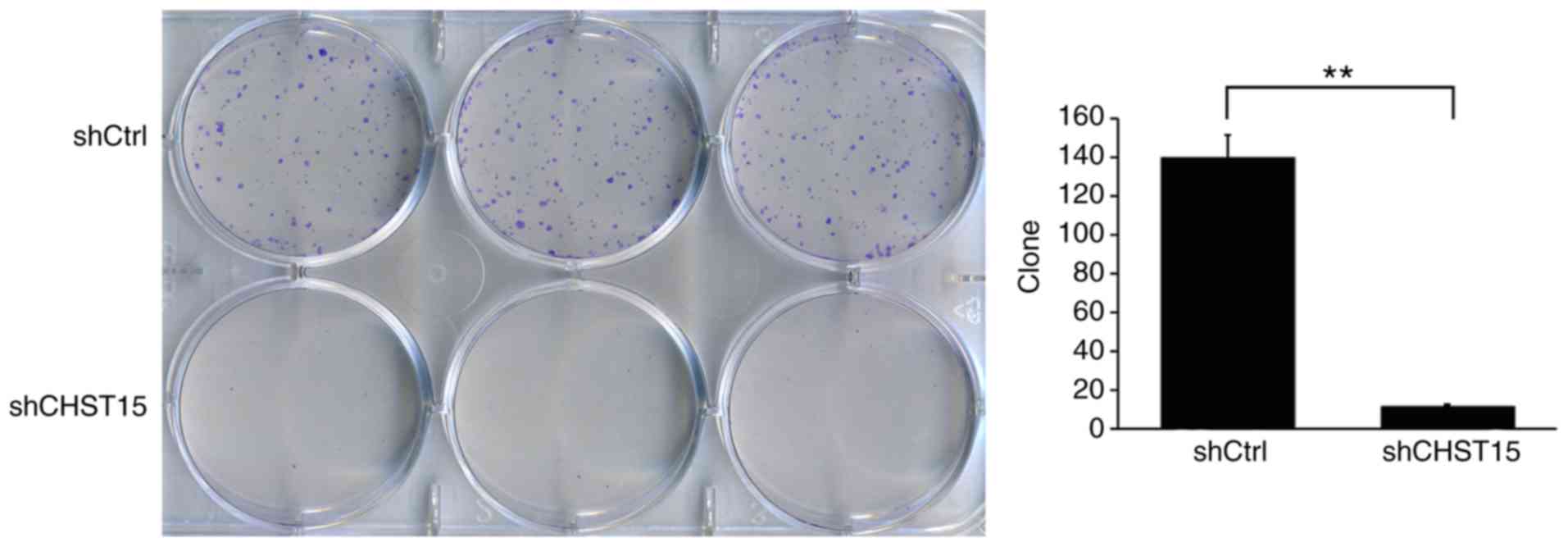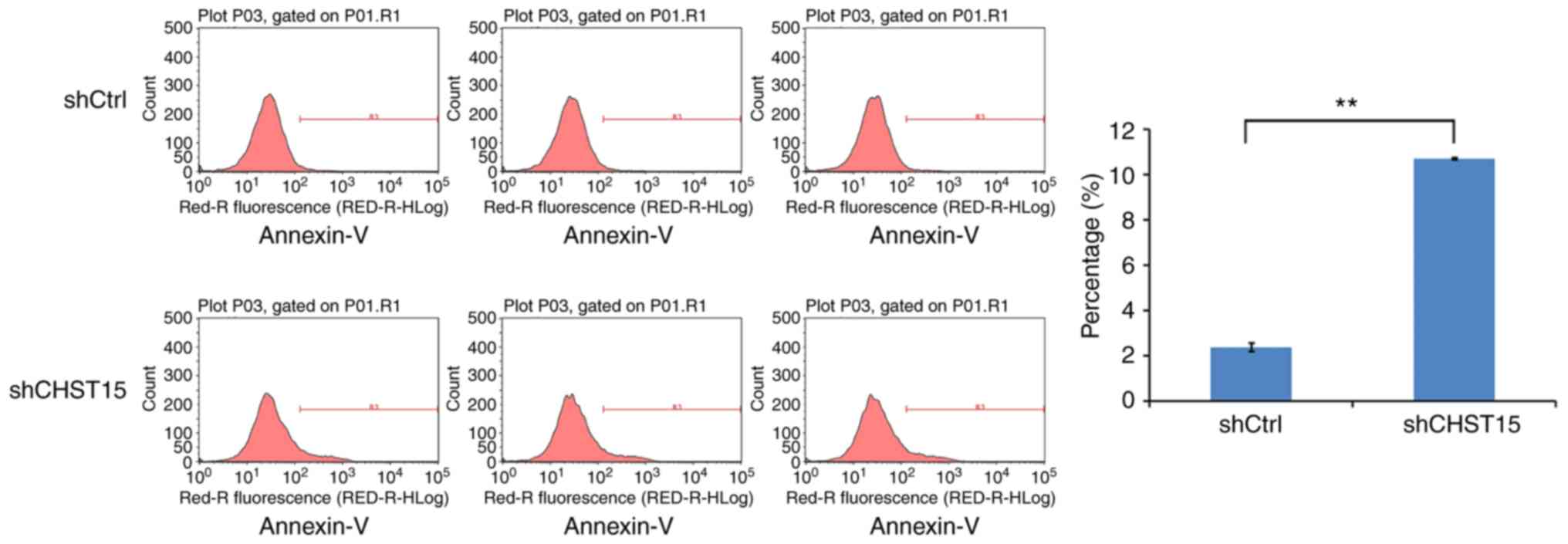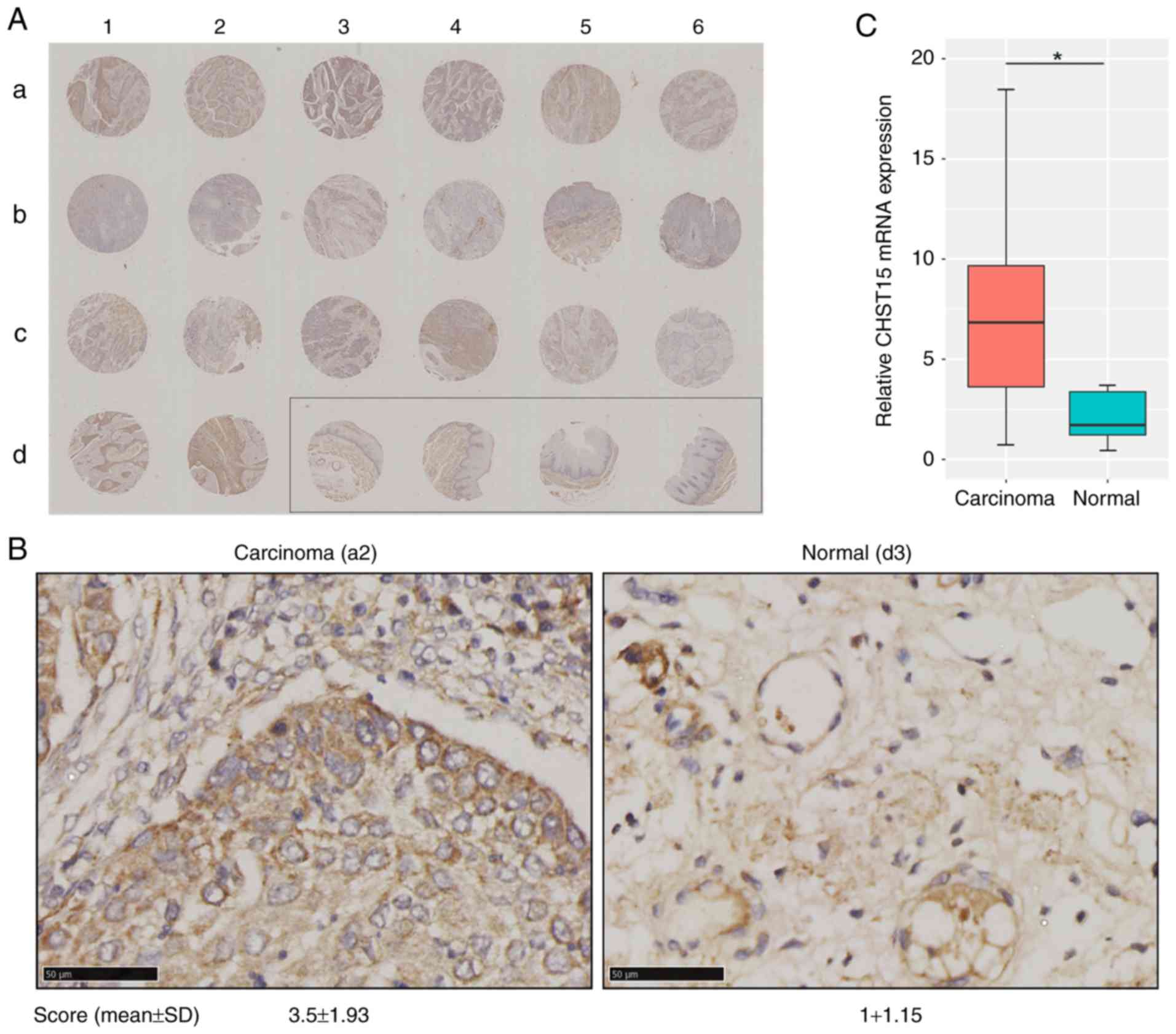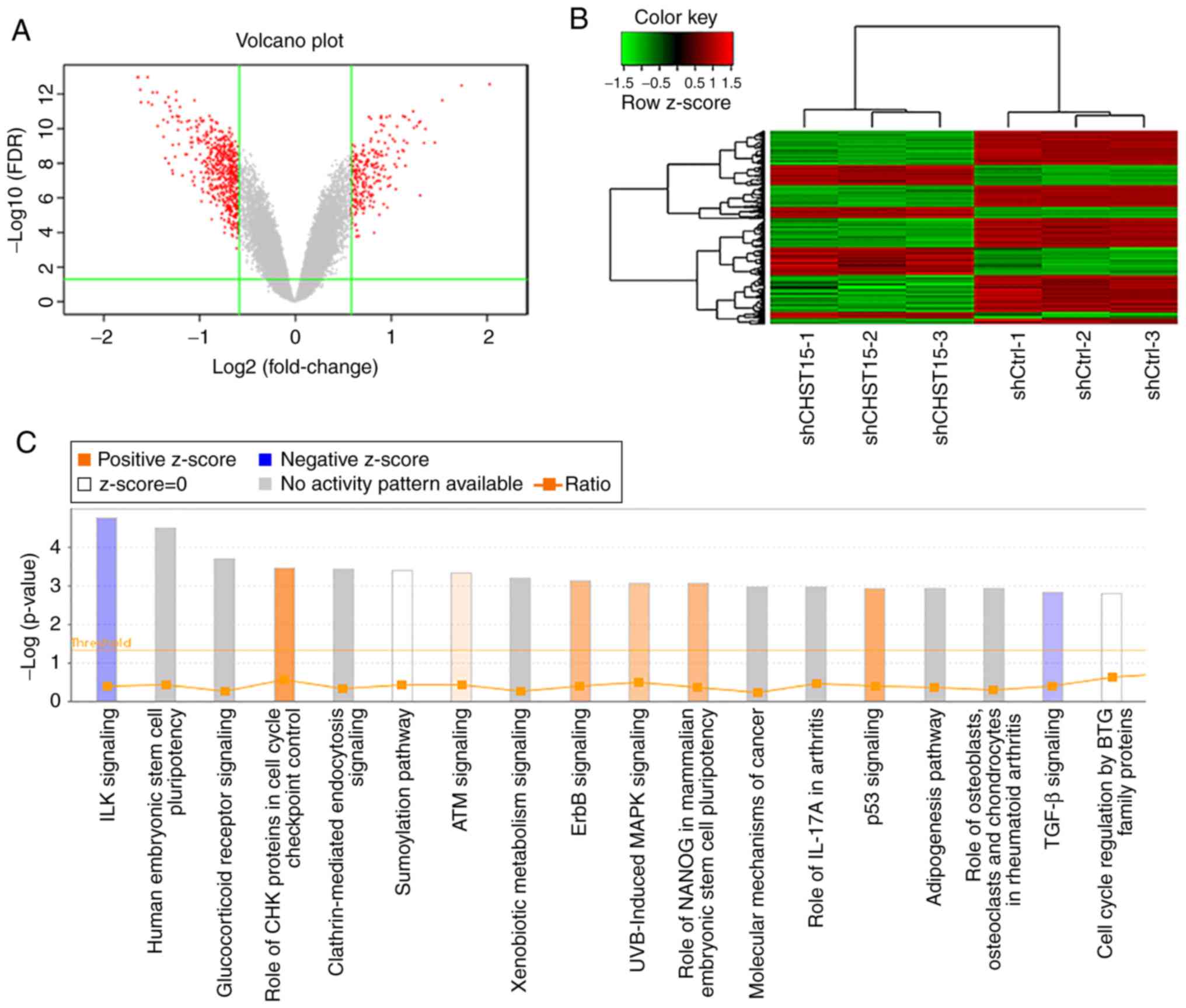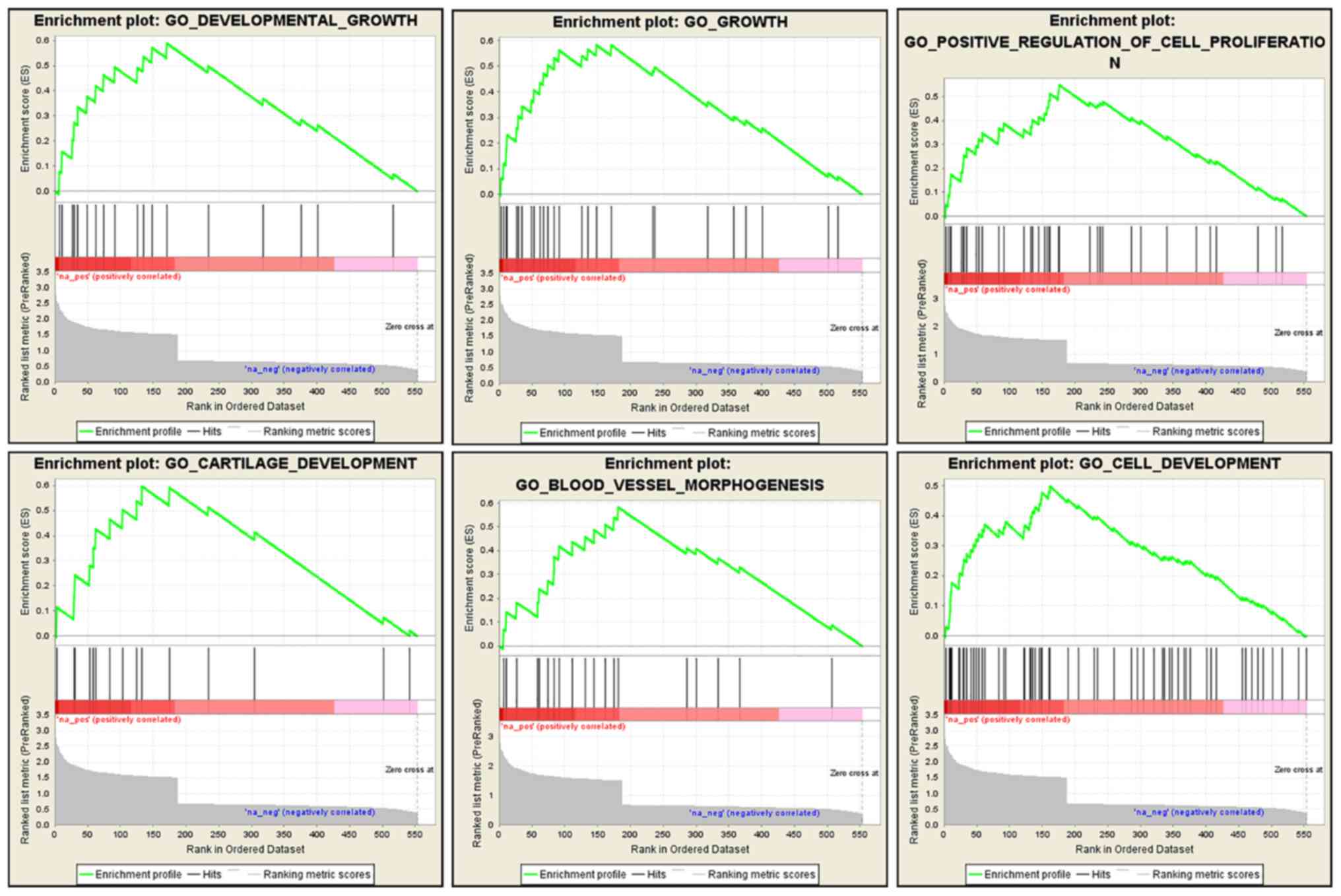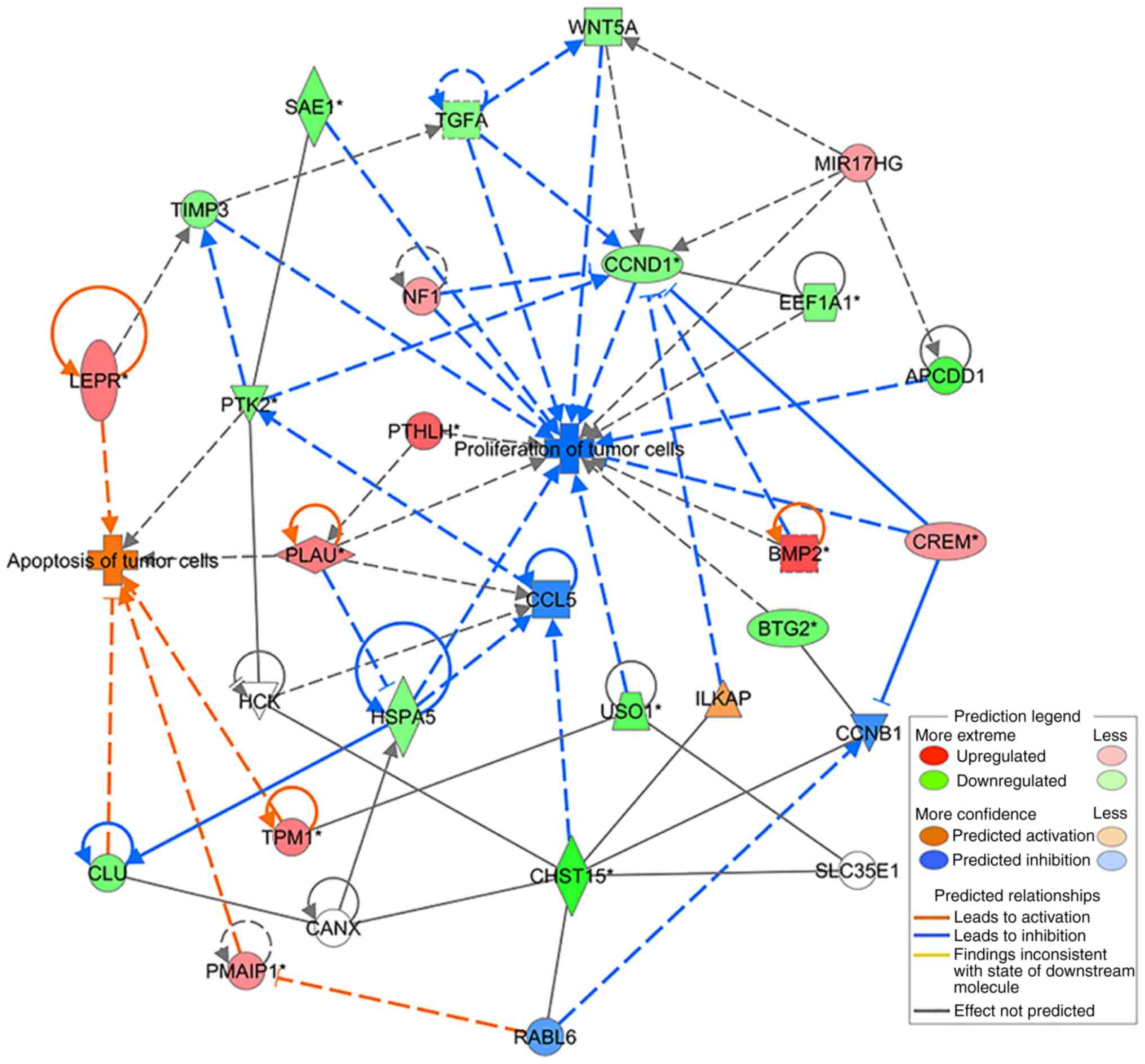|
1
|
Napier KJ, Scheerer M and Misra S:
Esophageal cancer: A Review of epidemiology, pathogenesis, staging
workup and treatment modalities. World J Gastrointest Oncol.
6:112–120. 2014. View Article : Google Scholar : PubMed/NCBI
|
|
2
|
Domper Arnal MJ, Ferrández Arenas Á and
Lanas Arbeloa Á: Esophageal cancer: Risk factors, screening and
endoscopic treatment in Western and Eastern countries. World J
Gastroenterol. 21:7933–7943. 2015. View Article : Google Scholar : PubMed/NCBI
|
|
3
|
Pennathur A, Gibson MK, Jobe BA and
Luketich JD: Oesophageal carcinoma. Lancet. 381:400–412. 2013.
View Article : Google Scholar : PubMed/NCBI
|
|
4
|
Wang J, Yu JM, Jing SW, Guo Y, Wu YJ, Li
N, Jiao WP, Wang L and Zhang YJ: Relationship between EGFR
over-expression and clinicopathologic characteristics in squamous
cell carcinoma of the esophagus: A meta-analysis. Asian Pac J
Cancer Prev. 15:5889–5893. 2014. View Article : Google Scholar : PubMed/NCBI
|
|
5
|
Hirashima K, Baba Y, Watanabe M, Karashima
R, Sato N, Imamura Y, Hiyoshi Y, Nagai Y, Hayashi N, Iyama K and
Baba H: Phosphorylated mTOR expression is associated with poor
prognosis for patients with esophageal squamous cell carcinoma. Ann
Surg Oncol. 17:2486–2493. 2010. View Article : Google Scholar : PubMed/NCBI
|
|
6
|
Takayama T, Nagao M, Sawada H, Yamada Y,
Emoto K, Fujimoto H, Ueno M, Hirao S and Nakajima Y: Bcl-X
expression in esophageal squamous cell carcinoma: Association with
tumor progression and prognosis. J Surg Oncol. 78:116–123. 2001.
View Article : Google Scholar : PubMed/NCBI
|
|
7
|
Nagaraja V and Eslick GD: Forthcoming
prognostic markers for esophageal cancer: A systematic review and
meta-analysis. J Gastrointest Oncol. 5:67–76. 2014.PubMed/NCBI
|
|
8
|
Cheng X, Wei L, Huang X, Zheng J, Shao M,
Feng T, Li J, Han Y, Tan W, Tan W, et al: Solute carrier family 39
member 6 gene promotes aggressiveness of esophageal carcinoma cells
by increasing intracellular levels of zinc, activating
phosphatidylinositol 3-kinase signaling, and up-regulating genes
that regulate metastasis. Gastroenterology. 152:1985–1997.e1912.
2017. View Article : Google Scholar : PubMed/NCBI
|
|
9
|
Jang HJ, Lee HS, Burt BM, Lee GK, Yoon KA,
Park YY, Sohn BH, Kim SB, Kim MS, Lee JM, et al: Integrated genomic
analysis of recurrence-associated small non-coding RNAs in
oesophageal cancer. Gut. 66:215–225. 2017. View Article : Google Scholar : PubMed/NCBI
|
|
10
|
Wang L, Yu X, Zhang Z, Pang L, Xu J, Jiang
J, Liang W, Chai Y, Hou J and Li F: Linc-ROR promotes esophageal
squamous cell carcinoma progression through the derepression of
SOX9. J Exp Clin Cancer Res. 36:1822017. View Article : Google Scholar : PubMed/NCBI
|
|
11
|
Yokoyama A, Kakiuchi N, Yoshizato T,
Nannya Y, Suzuki H, Takeuchi Y, Shiozawa Y, Sato Y, Aoki K, Kim SK,
et al: Age-related remodelling of oesophageal epithelia by mutated
cancer drivers. Nature. 565:312–317. 2019. View Article : Google Scholar : PubMed/NCBI
|
|
12
|
Ohtake S, Ito Y, Fukuta M and Habuchi O:
Human N-acetylgalactosamine 4-sulfate 6-O-sulfotransferase cDNA is
related to human B cell recombination activating gene-associated
gene. J Biol Chem. 276:43894–43900. 2001. View Article : Google Scholar : PubMed/NCBI
|
|
13
|
Takakura K, Shibazaki Y, Yoneyama H, Fujii
M, Hashiguchi T, Ito Z, Kajihara M, Misawa T, Homma S, Ohkusa T and
Koido S: Inhibition of cell proliferation and growth of pancreatic
cancer by silencing of carbohydrate sulfotransferase 15 in vitro
and in a xenograft model. PLoS One. 10:e01429812015. View Article : Google Scholar : PubMed/NCBI
|
|
14
|
Verkoczy LK, Guinn Ba and Berinstein NL:
Characterization of the human B cell RAG-associated gene, hBRAG, as
a B cell receptor signal-enhancing glycoprotein dimer that
associates with phosphorylated proteins in resting B cells. J Biol
Chem. 275:20967–20979. 2000. View Article : Google Scholar : PubMed/NCBI
|
|
15
|
Ohtake-Niimi S, Kondo S, Ito T, Kakehi S,
Ohta T, Habuchi H, Kimata K and Habuchi O: Mice deficient in
N-acetylgalactosamine 4-sulfate 6-O-sulfotransferase are unable to
synthesize chondroitin/dermatan sulfate containing
N-acetylgalactosamine 4,6-bissulfate residues and exhibit decreased
protease activity in bone marrow-derived mast cells. J Biol Chem.
285:20793–20805. 2010. View Article : Google Scholar : PubMed/NCBI
|
|
16
|
Mizumoto S, Watanabe M, Yamada S and
Sugahara K: Expression of N-acetylgalactosamine 4-sulfate
6-O-sulfotransferase involved in chondroitin sulfate synthesis is
responsible for pulmonary metastasis. Biomed Res Int.
2013:6563192013. View Article : Google Scholar : PubMed/NCBI
|
|
17
|
Sato H, Sagara S, Nakajima N, Akimoto T,
Suzuki K, Yoneyama H, Terai S and Yahagi N: Prevention of
esophageal stricture after endoscopic submucosal dissection using
RNA-based silencing of carbohydrate sulfotransferase 15 in a
porcine model. Endoscopy. 49:491–497. 2017. View Article : Google Scholar : PubMed/NCBI
|
|
18
|
Suzuki K, Arumugam S, Yokoyama J, Kawauchi
Y, Honda Y, Sato H, Aoyagi Y, Terai S, Okazaki K, Suzuki Y, et al:
Pivotal role of carbohydrate sulfotransferase 15 in fibrosis and
mucosal healing in mouse colitis. PLoS One. 11:e01589672016.
View Article : Google Scholar : PubMed/NCBI
|
|
19
|
Kai Y, Tomoda K, Yoneyama H, Kitabatake M,
Nakamura A, Ito T, Yoshikawa M and Kimura H: Silencing of
carbohydrate sulfotransferase 15 hinders murine pulmonary fibrosis
development. Mol Ther Nucleic Acids. 6:163–172. 2017. View Article : Google Scholar : PubMed/NCBI
|
|
20
|
Nishimura M, Matsukawa M, Fujii Y, Matsuda
Y, Arai T, Ochiai Y, Itoi T and Yahagi N: Effects of EUS-guided
intratumoral injection of oligonucleotide STNM01 on tumor growth,
histology, and overall survival in patients with unresectable
pancreatic cancer. Gastrointest Endosc. 87:1126–1131. 2018.
View Article : Google Scholar : PubMed/NCBI
|
|
21
|
Ito Z, Takakura K, Suka M, Kanai T, Saito
R, Fujioka S, Kajihara M, Yanagisawa H, Misawa T, Akiba T, et al:
Prognostic impact of carbohydrate sulfotransferase 15 in patients
with pancreatic ductal adenocarcinoma. Oncol Lett. 13:4799–4805.
2017. View Article : Google Scholar : PubMed/NCBI
|
|
22
|
van der Steen SC, van Tilborg AA, Vallen
MJ, Bulten J, van Kuppevelt TH and Massuger LF: Prognostic
significance of highly sulfated chondroitin sulfates in ovarian
cancer defined by the single chain antibody GD3A11. Gynecol Oncol.
140:527–536. 2016. View Article : Google Scholar : PubMed/NCBI
|
|
23
|
ten Dam GB, van de Westerlo EM,
Purushothaman A, Stan RV, Bulten J, Sweep FC, Massuger LF, Sugahara
K and van Kuppevelt TH: Antibody GD3G7 selected against embryonic
glycosaminoglycans defines chondroitin sulfate-E domains highly
up-regulated in ovarian cancer and involved in vascular endothelial
growth factor binding. Am J Pathol. 171:1324–1333. 2007. View Article : Google Scholar : PubMed/NCBI
|
|
24
|
Livak KJ and Schmittgen TD: Analysis of
relative gene expression data using real-time quantitative PCR and
the 2(-Delta Delta C(T)) method. Methods. 25:402–408. 2001.
View Article : Google Scholar : PubMed/NCBI
|
|
25
|
Subramanian A, Tamayo P, Mootha VK,
Mukherjee S, Ebert BL, Gillette MA, Paulovich A, Pomeroy SL, Golub
TR, Lander ES and Mesirov JP: Gene set enrichment analysis: A
knowledge-based approach for interpreting genome-wide expression
profiles. Proc Natl Acad Sci USA. 102:15545–15550. 2005. View Article : Google Scholar : PubMed/NCBI
|
|
26
|
Liu J, Xie X, Zhou C, Peng S, Rao D and Fu
J: Which factors are associated with actual 5-year survival of
oesophageal squamous cell carcinoma? Eur J Cardiothorac Surg.
41:e7–e11. 2012. View Article : Google Scholar : PubMed/NCBI
|
|
27
|
Dedhar S: Cell-substrate interactions and
signaling through ILK. Curr Opin Cell Biol. 12:250–256. 2000.
View Article : Google Scholar : PubMed/NCBI
|
|
28
|
Hannigan G, Troussard AA and Dedhar S:
Integrin-linked kinase: A cancer therapeutic target unique among
its ILK. Nat Rev Cancer. 5:51–63. 2005. View Article : Google Scholar : PubMed/NCBI
|
|
29
|
Shirley LA, McCarty S, Yang MC, Saji M,
Zhang X, Phay J, Ringel MD and Chen CS: Integrin-linked kinase
affects signaling pathways and migration in thyroid cancer cells
and is a potential therapeutic target. Surgery. 159:163–170. 2016.
View Article : Google Scholar : PubMed/NCBI
|
|
30
|
Stegh AH: Targeting the p53 signaling
pathway in cancer therapy-the promises, challenges and perils.
Expert Opin Ther Targets. 16:67–83. 2012. View Article : Google Scholar : PubMed/NCBI
|
|
31
|
Hein MY, Hubner NC, Poser I, Cox J,
Nagaraj N, Toyoda Y, Gak IA, Weisswange I, Mansfeld J, Buchholz F,
et al: A human interactome in three quantitative dimensions
organized by stoichiometries and abundances. Cell. 163:712–723.
2015. View Article : Google Scholar : PubMed/NCBI
|
|
32
|
Montalbano J, Lui K, Sheikh MS and Huang
Y: Identification and characterization of RBEL1 subfamily of
GTPases in the Ras superfamily involved in cell growth regulation.
J Biol Chem. 284:18129–18142. 2009. View Article : Google Scholar : PubMed/NCBI
|
|
33
|
Tang H, Ji F, Sun J, Xie Y, Xu Y and Yue
H: RBEL1 is required for osteosarcoma cell proliferation via
inhibiting retinoblastoma 1. Mol Med Rep. 13:1275–1280. 2016.
View Article : Google Scholar : PubMed/NCBI
|
|
34
|
Hassan M, Alaoui A, Feyen O,
Mirmohammadsadegh A, Essmann F, Tannapfel A, Gulbins E,
Schulze-Osthoff K and Hengge UR: The BH3-only member Noxa causes
apoptosis in melanoma cells by multiple pathways. Oncogene.
27:4557–4568. 2008. View Article : Google Scholar : PubMed/NCBI
|
|
35
|
Oda E, Ohki R, Murasawa H, Nemoto J,
Shibue T, Yamashita T, Tokino T, Taniguchi T and Tanaka N: Noxa, a
BH3-only member of the Bcl-2 family and candidate mediator of
p53-induced apoptosis. Science. 288:1053–1058. 2000. View Article : Google Scholar : PubMed/NCBI
|
|
36
|
Kumar AS, Naruszewicz I, Wang P,
Leung-Hagesteijn C and Hannigan GE: ILKAP regulates ILK signaling
and inhibits anchorage-independent growth. Oncogene. 23:3454–3461.
2004. View Article : Google Scholar : PubMed/NCBI
|
|
37
|
Leung-Hagesteijn C, Mahendra A,
Naruszewicz I and Hannigan GE: Modulation of integrin signal
transduction by ILKAP, a protein phosphatase 2C associating with
the integrin-linked kinase, ILK1. EMBO J. 20:2160–2170. 2001.
View Article : Google Scholar : PubMed/NCBI
|
|
38
|
Yang K, Hitomi M and Stacey DW: Variations
in cyclin D1 levels through the cell cycle determine the
proliferative fate of a cell. Cell Div. 1:322006. View Article : Google Scholar : PubMed/NCBI
|















